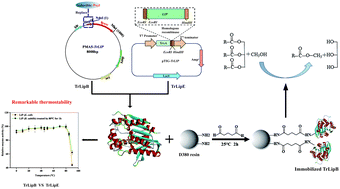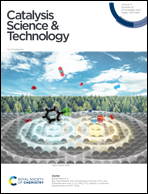Preparation and characterization of a novel thermostable lipase from Thermomicrobium roseum†
Abstract
In this study, a hypothetical lipase gene from Thermomicrobium roseum DSM 5159 (GenBank: ACM04789.1) was recombinantly expressed and characterized. The TrLIP gene was inserted into two different plasmids (pTIG and pMA5 constructed by our laboratory) and further expressed in E. coli BL21 and B. subtilis W600 (TrLIPB/E), respectively. After purification, TrLipE/B showed a single band at approx. 38 kDa on 10% reducing SDS-PAGE gels. The successful expression of TrLipE/B was further confirmed by peptide map fingerprinting (PMF) analysis. For both expression systems, the target enzyme revealed marked stability over a wide temperature and pH range. In E. coli BL21, the optimal temperature and pH were 85 °C and 8.5, while these were 90 °C and 9 in B. subtilis W600. Additionally, the studied TrLipE/B was found to show remarkable tolerance in mixed systems constituted by water and organic solvents. Depending on the different expression systems, TrLipB has better enzymatic properties, in particular, thermostability and organic solvent tolerance. Based on the circular dichroism (CD) analysis, the corresponding helix, β-sheet, β-turn and random coil compositions were slightly different between TrLipE (34.8%, 11.2%, 23.4% and 30.6%) and TrLipB (35.9%, 11.1%, 23.3% and 29.7%). The thermostability of TrLipE/B was further verified with nano-DSC analysis. The melting temperature (Tm) and denaturation enthalpy (ΔH) of TrLipE were 97.51 °C and 1637 KJ mol−1, 98.53 °C and 1463 kJ mol−1 for TrLipB. The substrate specificity and enzymatic kinetics were analyzed as well. The studied TrLipE/B's capability to catalyze p-nitrophenol esters with different carbon chain lengths was verified. Enzymatic transesterification of immobilized TrLipB was confirmed, with a molar conversion rate of 23.32%. This research therefore provides a candidate that could be applied for biocleanser production and organic synthesis, especially under environments requiring high temperature.



 Please wait while we load your content...
Please wait while we load your content...